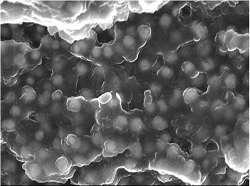 |
| An electron image of the smart implant loaded with stealth nanoparticles.--Courtesy of Northeastern University |
Researchers in Massachusetts have designed a nanoparticle implant carrying platinum-based drugs with a one-two-three punch against tumors--the radiotherapy-triggered nanomeds attack a tumor's blood vessels, kill the cells that lead to cancer recurrence and, finally, release a chemo drug that specifically targets the cancer.
The team of scientists at Brigham and Women's Hospital and the Dana Farber Cancer Institute, as well as collaborators at Boston-area universities, has developed a system they call RAID--radiotherapy application with in situ dose-painting--to place markers in cancer cells that allow for the delivery of the platinum-drug-carrying nanoparticles, which are then activated by radiotherapy. In a series of attacks on a tumor's source of nutrients, the highly targeted nanoparticles give the cancer cells a lethal dose of drugs while leaving surrounding healthy cells alone, according to a report at MedicalPhysicsWeb.
In the first of three steps, the researchers inject into the tumor fiducial markers with a polymer coat, which dissolves to reveal the nanoparticles filled with the platinum-based drug cisplatin. These are activated by radiation to boost the amount of damage to the tumor's blood vessels. The second step involves boosting the radiation to target the most dangerous cancer cells, those which cause recurrence or metastasis. Then, once the cells are weakened substantially, the nanoparticles release a dose of chemotherapy from the inside of the tumor, according to the report.
The researchers involved with the project have studied the effect of gold nanoparticles on cancer cells, but using FDA-approved platinum drugs instead gives the treatment a chemotherapy effect on top of the radiotherapy dose. Also, MedicalPhysicsWeb reports, platinum-based drugs are potentially more cost-effective for commercial use.
"The promising result of using approved platinum-based nanoparticles combined with experimental results of the past two years convince us that our new RAID approach to cancer provides a number of possibilities for customizing and significantly improving radiotherapy," lead author Wilfred Ngwa said in a statement.
Animal tests are ongoing, currently, and the researchers are looking for sources of funding to carry the technique to the clinical stage.
- here's the MedicalPhysicsWeb report